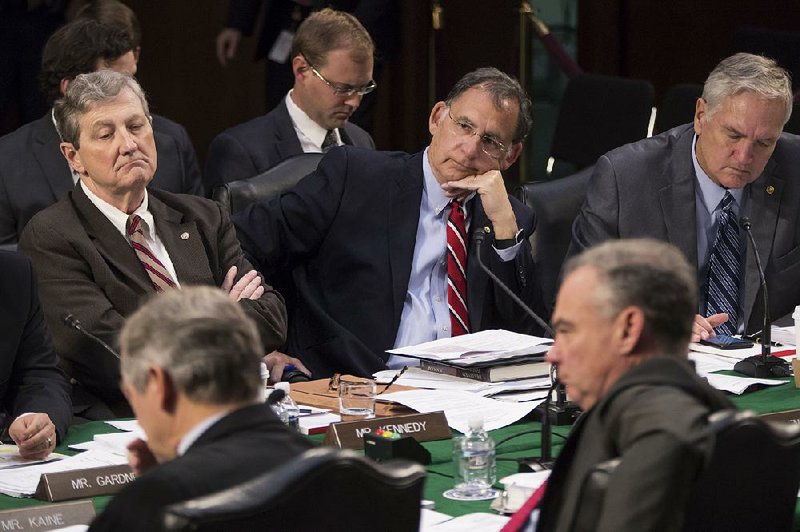WASHINGTON -- The U.S. House on Thursday took the first major legislative step toward a promised overhaul of the tax code, approving a $4.1 trillion budget blueprint that would allow a future tax bill to pass in Congress without any Democratic votes.
The House voted 219-206 to pass the budget resolution, with 18 Republicans voting against it.
The belated approval of a spending and revenue blueprint for the fiscal year that began Sunday offered a momentary display of Republican cohesion as the party moves ahead in its attempt to overhaul the tax code for the first time since Ronald Reagan was president.
The White House issued a statement Thursday saying the House measure is a key step toward "Making America Great Again."
[PRESIDENT TRUMP: Timeline, appointments, executive orders + guide to actions in first 200 days]
The blueprint ostensibly charts a path toward a balanced budget over the next 10 years, giving Republicans something to offer their core conservative voters while providing Democrats with new lines of attack in the 2018 midterm elections.
The measure calls for more than $5 trillion in spending cuts over the coming decade, promising to slash Medicaid by about $1 trillion over the next 10 years, cutting other health care costs and forcing huge cuts to domestic programs funded by Congress in future years.
"It's a budget that will help grow our economy, and it's a budget that will help rein in our debt," said House Speaker Paul Ryan, R-Wis. "It reforms Medicaid. It strengthens Medicare."
But few people believe that the broad spending road map will lead anywhere. The budget measure includes parliamentary language that would shield a future tax bill from a filibuster in the Senate.
"Our budget is the golden key that unlocks pro-growth tax reform," said Rep. Diane Black, R-Tenn., chairman of the House Budget Committee.
To ease passage of a tax overhaul, the budget blueprint passed by the House includes language that would allow for a tax bill to be considered under special procedures in the Senate. That approach would allow approval of the bill with only 50 votes, with Vice President Mike Pence breaking any tie, rather than the 60 votes needed to overcome a filibuster. Republicans have 52 seats in the Senate.
"We're united in getting tax reform legislation to the president's desk this year," said Rep. Kevin Brady, R-Texas, chairman of the Ways and Means Committee. "But if we do not pass a budget, tax reform doesn't move forward."
Republicans followed the same approach in their attempt to repeal and replace the Patient Protection and Affordable Care Act. But in that effort, they could never come up with a repeal measure that 50 Republican senators would support.
The same challenge looms now that the subject is taxes.
After facing pressure from lawmakers, Republican leaders are already backing away from a proposal to fully repeal the deduction for state and local taxes. Rep. Leonard Lance, R-N.J., said the proposal to do away with that deduction, which is widely used in his state, was one of the main reasons he voted against the budget resolution Thursday.
"I have confidence that leadership understands our concerns," Lance said.
Democrats, meanwhile, seized on the budget measure, arguing that Republicans were clearing the way for a partisan tax plan that would benefit the rich.
"I was elected not just to represent millionaires, but to represent aspiring millionaires, working families, seniors, veterans," said Rep. John Yarmuth of Kentucky, the ranking Democrat on the House Budget Committee. "And for all of them, for anyone who isn't already a millionaire, this budget is a slap in the face."
Democrats also blasted the proposed spending cuts -- more than $5 trillion over 10 years in the House plan and somewhat less in the Senate GOP measure -- as an attack on middle-class families and the poor.
"Is it a statement of our values to take a half-trillion dollars out of Medicare to give a tax cut to the wealthiest people in our country?" asked House Minority Leader Nancy Pelosi, D-Calif.
The Democratic Congressional Campaign Committee highlighted that reduction in a new online ad.
"After proving completely incapable of delivering results for Americans this year," said Meredith Kelly, a spokesman for the committee, "it's shocking that House Republicans would willingly expose their out-of-touch priorities by voting to slash programs like Medicare and investments in education to pay for tax cuts for their favorite corporations and special interests."
The Senate Budget Committee unveiled its own budget resolution last week, and the panel approved it Thursday, hours after the House passed its budget blueprint. To secure parliamentary protection, the House and Senate will need to agree on identical budget resolutions. Right now, their proposals have some key differences.
The Senate Budget Committee's plan would result in a deficit of $424 billion in 2027, according to the Congressional Budget Office.
The House measure assumes that the coming tax bill won't add to the deficit. The Senate version, however, would permit the measure to add $1.5 trillion to the $20 trillion-plus national debt over the coming 10 years.
The final version is likely to stick closely to the Senate measure in key respects. A final House-Senate agreement won't come until November, Black said, adding that she anticipated conflict over the Senate plans.
"That is certainly going to be a very lively discussion," Black said of House-Senate talks. "Our members are concerned about [budget] balance, and they're also concerned about the debt and deficits."
Senate Minority Leader Charles Schumer, D-N.Y., called on Republicans to scrap their plan for a partisan bill and work with Democrats or risk dividing their own party over taxes. He warned the GOP that Democrats will not help pass any bill that would cut taxes on the wealthy and add to the deficit without delivering equal benefits to the middle class.
"Don't just do a Republican plan that appeals to a handful of very wealthy corporations and very wealthy individuals," Schumer said Thursday. "We are ready. But if you do the same thing you did on health care, and try to do it by yourselves, I think you will meet with the same fate that the health care bill did."
The four House members from Arkansas, all Republicans, supported the House budget resolution.
Rep. Steve Womack of Rogers called it a "responsible plan, a plan geared towards helping working families and small businesses across America." In a written statement, the House Budget Committee member said he was "proud to have supported the legislation from conception."
Rep. French Hill of Little Rock said passage of the budget would clear the way for lawmakers to focus next on changing the nation's tax laws.
The budget's passage is an indicator that "we're making progress to responsibly govern and balance our budget within ten years," he said in a written statement.
Rep. Rick Crawford of Jonesboro said on Twitter that the budget's passage "creates the foundation for #taxreform."
Rep. Bruce Westerman of Hot Springs praised the Republican budget approach, previously writing that it "makes the hard choices that are necessary in order to get our fiscal house in order."
Information for this article was contributed by Thomas Kaplan of The New York Times; by Andrew Taylor of The Associated Press; by Mike DeBonis and Kelsey Snell of The Washington Post; and by Frank E. Lockwood of the Arkansas Democrat-Gazette.
A Section on 10/06/2017


